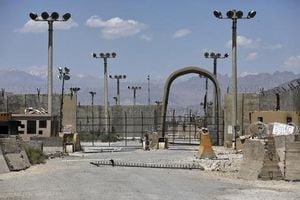The political fallout from the assassination of conservative activist Charlie Kirk on September 10, 2025, has spiraled into an explosive national debate, drawing in high-profile figures from sports, politics, and media. At the center of the storm is Representative Ilhan Omar of Minnesota’s 5th District, whose controversial remarks about Kirk’s legacy have ignited fierce backlash from Republican lawmakers, former President Donald Trump, and even golf legend Phil Mickelson. The controversy has exposed deep divisions in American political discourse, with accusations of hate, ignorance, and xenophobia flying across social media and cable news.
It all began in the days following Kirk’s assassination, a shocking event that left the conservative movement reeling. As Kirk was being honored with a high-profile funeral service, Omar made public comments comparing Kirk to “Dr. Frankenstein” and argued that his legacy should be left “in the dust bin of history.” According to BBC, Omar stated, “I am not going to sit here and be judged for not wanting to honor any legacy this man has left behind, that should be in the dustbin of history, and we should hopefully move on and forget the hate that he spewed every single day.” Her refusal to apologize for sharing a video that called Kirk “Dr. Frankenstein” only intensified the uproar.
Omar’s remarks were swiftly condemned by many on the right. Republican Representative Nancy Mace of South Carolina, in particular, was incensed. She introduced a resolution in Congress to censure Omar for allegedly “smearing Charlie Kirk.” The measure, however, failed by the narrowest of margins—214 votes to 213—on September 17, 2025. Mace did not mince words afterward, writing on X (formerly Twitter), “Ilhan Omar mocked the cold-blooded assassination of an innocent American husband and father. She’s supported ISIS. She’s supported the Muslim Brotherhood. She’s incited political violence. And tonight, Congress protected her.” She added, “We would love to see you deported back to Somalia next.”
Phil Mickelson, the six-time major golf champion, joined the fray by amplifying Mace’s comments and posting his own scathing critique of Omar. On September 20, 2025, Mickelson wrote on X: “Ilhan spews hate every time she opens her mouth, she came here fraudulently and will hopefully be sent back to Somalia soon.” According to NBC News, Mickelson’s post reflected a sentiment echoed by many of Kirk’s supporters, who viewed Omar’s comments as not just disrespectful, but fundamentally un-American.
The backlash did not stop there. Former President Donald Trump, always quick to seize on a polarizing issue, took to social media to blast Omar. Trump wrote, “Somalia is consistently ranked among the world’s most corrupt countries, including bribery, embezzlement, and a dysfunctional government. All of this, and Ilhan Omar tells us how to run America! … What SCUM we have in our country, telling us what to do, and how to do it.” Trump also called for Omar’s impeachment, despite the fact that members of Congress cannot be impeached under the U.S. Constitution.
Omar, for her part, was not cowed by the torrent of criticism. In an interview on The Weekend Prime, she dismissed Trump’s attacks as “unhinged” and pointedly mocked his call for her impeachment. “He’s supposed to be the president of the United States, heading off to Europe to represent us. When he does, he’s educated enough to understand that members of Congress can’t be impeached,” she said, as reported by CNN. Omar went on to accuse Trump and his allies of peddling falsehoods about immigrants and using inflammatory rhetoric for political gain. “When they’re saying they’re going to deport me knowing fully well that you cannot deport an American citizen, what that displays for not just Americans but folks on an international platform is that our country is being led by idiots, and that is not something that we would be comfortable with,” she stated.
The congresswoman’s frustration was palpable. “I feel great sadness that these are the kinds of people representing us,” she said, expressing concern that the rhetoric surrounding her citizenship and loyalty was both inaccurate and damaging to the nation’s reputation abroad. According to The Guardian, Omar argued that the repeated threats to deport her—despite her status as a naturalized U.S. citizen—only served to embarrass the United States on the world stage. “Their comments expose themselves for how stupid they are, which is embarrassing for us as a country,” she remarked.
The episode has highlighted not only the enduring partisan animosity in Washington, but also the fraught dynamics of race, immigration, and identity in American politics. Omar, one of the first two Muslim women elected to Congress and a Somali-born refugee, has long been a lightning rod for criticism from the right. Her detractors accuse her of harboring anti-American sentiments and supporting extremist groups—allegations she has repeatedly denied. Her supporters, meanwhile, argue that the attacks against her are motivated by racism and Islamophobia, and that she is being unfairly targeted for speaking out against conservative figures like Kirk.
For many observers, the controversy is emblematic of a broader trend in U.S. political discourse: the weaponization of identity and the blurring of lines between legitimate criticism and personal attacks. The fact that a celebrated sports figure like Mickelson would wade into the debate underscores just how deeply polarized the country has become. According to The New York Times, Mickelson’s remarks drew both praise and condemnation, with some fans applauding his willingness to speak out and others decrying his comments as xenophobic.
Meanwhile, the failed censure vote in Congress has only heightened tensions. Some Republicans view the narrow defeat as evidence of a double standard, arguing that Democrats are protecting Omar from accountability. Democrats, for their part, contend that the censure effort was a politically motivated stunt designed to distract from more pressing issues. As the dust settles, it remains to be seen whether the episode will have any lasting impact on Omar’s political career—or on the broader debate over free speech, immigration, and national identity.
One thing is clear: the assassination of Charlie Kirk and the subsequent firestorm over Omar’s comments have once again exposed the raw nerves of American politics. With high-profile figures on all sides weighing in, the story continues to evolve, reflecting the deep divisions—and the enduring questions—at the heart of the nation’s political life.




